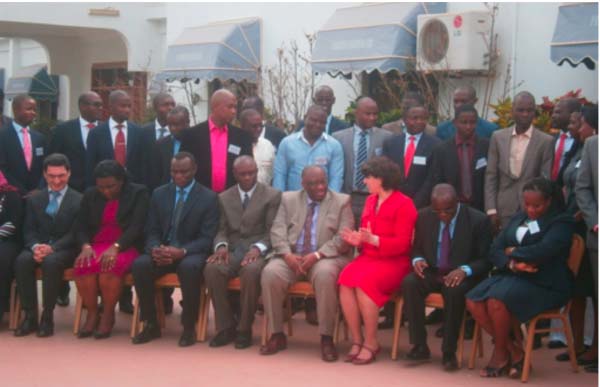
A five-day regional course on balance of payments statistics organised by WAIFEM, IMF and the Central Bank of The Gambia commenced on Monday at the Paradise Suites Hotel.
The forum brought together participants from Liberia, Nigeria, Ghana, Sierra Leone and The Gambia.
In his official opening statement, the first Deputy Governor of the Central Bank of The Gambia, Basiru Njie, said statistics are essential to policymakers, as well as analysts in the public sector, the private sector and international organizations.
The compilation of external statistics is becoming more complex due to recent changes in the nature of such transactions. The balance of payments compilers require professionalism, to not only do the task, but to serve and communicate with the end users, he added.
Mr Njie thanked the organizers for conducting the course in Banjul, and commended the West African Monetary Agency (WAMA) for partnering with WAIFEM to build capacity in this critical area.
“The development and harmonization of BOP statistics is an important component of the ECOWAS single currency roadmap project,” he said, while emphasizing the importance of payments statistics and international investment position.
In his welcome remarks, the Director General of WAIFEM, Prof. Akpan H. Ekpo, thanked the President, government and the “good people” of The Gambia for welcoming them to conduct the training course in Banjul.
He also registered his “profound appreciation” to the IMF and the statistics department for joining them to build capacity in the West African sub-region.
WAIFEM was established by the Central Banks of The Gambia, Ghana, Liberia, Nigeria, and Sierra Leone in 1996, principally to build capacity for improved macroeconomic and financial management in the constituent member countries, he said.
“The mission of the institute is to develop on a sustainable basis, expertise in the fields of macroeconomics, debt and financial sector management among the staff of central banks, ministries of finance and economic planning and other public sector bodies with the core economic management responsibilities,” he said.
According to Prof. Ekpo, WAIFEM had established a collaborative arrangement with world-class training organizations and capacity building institutions to ensure best practices in the delivery of its programme, and as a center of excellence in capacity building.
“These include, among others, the International Monetary Fund, the World Bank, Commonwealth Secretariat, Debt Relief International and the United Nations Institute for Training and Research (UNITAR),” the WAIFEM DG stated.
Concluding, he said: “The main objective of this course is to get participants conversant with the revised Balance of Payments Manual (BPM6) and International Investment Position (IIP).”
The course is expected to upgrade the knowledge and skills of participants in the compilation of balance of payments and the system of national accounts, and the inter-linkages between balance of payments and other sectoral accounts.
The course has been designed to cover a number of key topics such as introduction to the balance of payments and international investment position manual, sixth edition; accounting principles; economic territory units, institutional sectors, and residency,among other financial instruments.
Professor Mohamed Ben Omar Ndiaye, Director General of WAMA, in his remarks thanked the Central Bank of The Gambia for the facilities placed at the disposal of participants, as well as for its significant contribution to the capacity-building programme in the region and continued support to the activities of WAMA.
He reaffirmed the commitment of WAMA to work closely with WAIFEM and other regional institutions to not only sustain the capacity building momentum, but also to facilitate successful implementation of harmonization of balance of payments statistics and other key components of the ECOWAS Single Currency Roadmap.
EndFragmentRead Other Articles In Article (Archive)

STOMACH ULCER IS “THE COMMONEST” DISEASE IN THE GAMBIA.WHAT TO BLAME?
Jan 10, 2017, 11:03 AM


